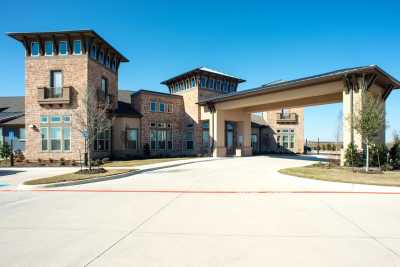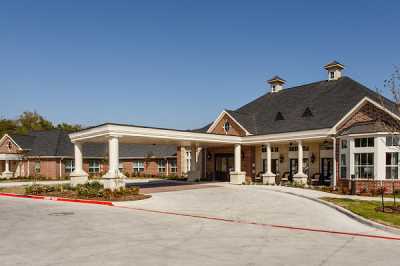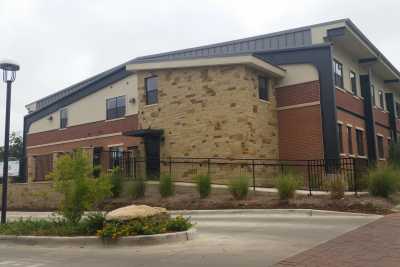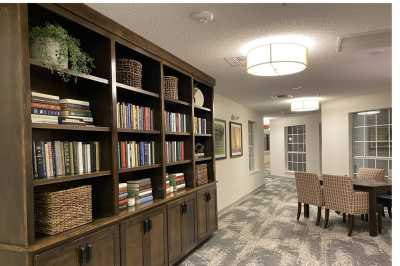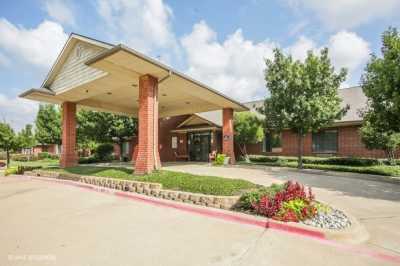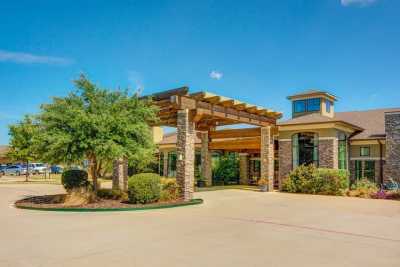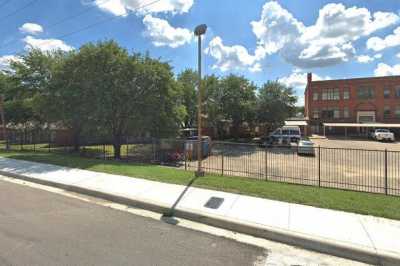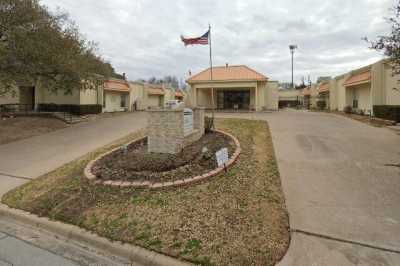
10 Best Memory Care Facilities in Fort Worth, TX
Fort Worth offers a small-town, family-friendly feel within a big-city environment due to its close proximity to Dallas. Families relish the appealing suburban atmosphere of Fort Worth without sacrificing the conveniences and entertainment available in a roaring metropolis like Dallas. Fort Worth also attracts seniors with its ideal weather conditions, enticing nature areas, and plenty of senior-friendly activities. It also has a city-wide dementia-friendly initiative, which provides accessibility options designed just for seniors with dementia throughout the city.
To further Fort Worth’s senior-friendliness, the city offers a range of senior living options to accommodate the aging population — including memory care facilities. In fact, A Place for Mom partners with 19 memory care facilities within a 10-mile radius of Northside Fort Worth. Memory care facilities boast intentional design features, person-centered care services, and specialized memory care programming to foster a safe space for seniors in the early and late stages of dementia. In addition to robust memory care services, these facilities offer assisted living care services, like assistance with activities of daily living (ADLs), medication management, dining plans, and many other senior care services.
With this guide to memory care in Fort Worth, you can browse the various types of memory care communities in the area. Narrow down options for your loved one by what matters most to your family — with resident ratings on cleanliness, care services, amenities, and more. You’ll also find local data on memory care costs, how families typically pay, Texas memory care regulations, senior-specific benefit resources, and senior-friendly activities in the Fort Worth area.
Fort Worth Memory Care Facilities | 1554 Reviews
Been at Brookdale for 2+ months. Very cohesive staff. Nice Director. Separate building for memory care only. Light , bright rooms, no elevator, clean. Her bed always made, and room organized (she can't do...
The staff are incredibly friendly and helpful. Always willing to address any concerns immediately. I would recommend Truewood River Park to others looking.
My mom is approaching 1 year of living here. The staff at the ridglea have treated her right. They are open, honest, and willing to listen to feedback and improve. The place is clean and by far the cleanest...
This is what my mother said as she toured. She was instantly at home, at ease. She called Discovery Village "home" for 3+ years. She has made many friendships. DV provides a place for residents to LIVE!
The move in efforts from the sales team was great. [name removed] met with us virtually and then face to face to review misc apartments so my mom could decide. They moved us into a temporary location so...
This facility is the best place around. My mother-in-law is very happy there! They have so many activities from cake decorating to bingo. She was hesitant to participate at first. But now, sometimes when we...
The community offers outstanding care. Communication between the staff and our family is wonderful. They call and email with any issues or question, they respond in a timely manner and have Information...
This community is the best. the community supports good life memory care, they make the residents feel loved and special, they give gifts on all the holidays to the residents. Good life is a very loving and...
I would recommend it for an assisted living center. The director is very responsive to questions/concerns. The staff is friendly for the most part. Staff members that are not a good fit are either trained to...
I would highly recommend the community to others for their loved ones. Everyone is so nice and the community feels like home for my loved one. The staff are very helpful if I ever have questions or...
Our free advisors can help
- Compare local facilities
- Determine care type
- Schedule tours
- Evaluate pricing
Dr. [name removed] was the physician covering at the time we were there. She was awesome. I felt like she and the head nurse there were caring and made a huge difference to me. We weren't there long...
Our methodology
How we rank order the Fort Worth community options above
We developed a proprietary recommendation system that orders Fort Worth community options based on factors we know are important to seniors and their families:
- Proximity to your search location
- Availability of recent, high-quality reviews
- The amount of detailed community information available
Where we source our information
14,000+ communities
We collect proprietary data from our network of 14,000+ senior living communities in the U.S., with regular refreshes of data and information
350,000+ reviews
We have 387,000+ reviews from senior living residents and family members that provide first-hand accounts about senior living communities
- Costs of memory care in the Fort Worth area
- What families are saying about memory care in Fort Worth
- How people pay for memory care in Fort Worth
- Understand Texas laws and regulations for memory care facilities
- Fort Worth dedicates itself to dementia-friendly initiatives
- Fort Worth memory care services and amenities
- Explore senior care with confidence
- Unfamiliar with Fort Worth? Highlights for seniors
- Health care for seniors in Fort Worth
- Transportation for seniors in Fort Worth
- Dementia-friendly activities for seniors in Fort Worth
Costs of memory care in the Fort Worth area
The average rent at A Place for Mom’s partner Fort Worth memory care communities is $5,543 per month, according to our 2022-2023 proprietary data.[01] These Fort Worth memory care communities are a great option for seniors who want to stay close to Dallas without its high prices. As a matter of fact, memory care prices in Fort Worth drop by nearly a grand compared to Dallas memory care facilities.
Our figure above only accounts for rent at a Fort Worth memory care community. It’s important to note that costs may vary based on the community’s location, the selected floor plan, the available amenities, and your loved one’s required level of care. Luckily, there are several amenities and services included in Fort Worth’s baseline rent for memory care communities. Here are some of the most typical amenities and services you’ll find included in baseline costs of our partner Fort Worth memory care facilities:
- Assistance with activities of daily living (ADLs — bathing, grooming, dressing, etc.)
- Housekeeping and laundry services
- A meal plan with three meals and snacks daily
- Standard apartment maintenance and community landscaping
- Personalized memory care activities (like specialized therapies, brain games, etc.)
- Access to all on-site amenities (like fitness centers, pools, crafts centers, libraries, life-skill stations, etc.)
The following on-site services are also typically available at our partner DFW memory care communities, but they may result in additional fees:
- Advanced care services (behavior management, medication management, chronic disease management, etc.)
- Room service and special meal accommodations
- Roommate fees
- Pet rent, care, and grooming
- Salon, spa, or barbershop services
- Transportation services
The figures below represent average baseline costs for Fort Worth memory care facilities and provide a good cost comparison for the area. These numbers don’t account for any service add-ons or fees.
Average monthly cost of Memory Care in Fort Worth, TX vs. nearby cities
Average monthly cost of Memory Care in Fort Worth, TX vs. the state and national average
Average monthly cost of Memory Care in Fort Worth vs. other types of senior living
Median monthly costs of Memory Care in Fort Worth, TX by room type
What families are saying about memory care in Fort Worth
Recent reviews for memory care in Fort Worth
Wilshire in Burleson, TX
Brookdale Richland Hills (MC)
Silverado Southlake
Fort Worth review score based on 337 family reviews
This proprietary review score is based on 337 reviews of 37 Fort Worth memory care communities. All reviews were submitted in the past two years by verified community residents and family members.Fort Worth review score compared against nearby cities
Review subcategories for Fort Worth memory care
When memory care residents and family members submit a review on our site, they rate each community on categories such as cleanliness, activities, meals, and more. The chart below is based on 337 reviews of 37 Fort Worth memory care communities. This chart helps you compare Fort Worth resident and family memory care satisfaction rates against national averages. Use it to assess your needs and develop criteria for your own search. If you know that one of these categories is important to you or your loved one, our senior living advisors can help you find communities to match your needs.How people pay for memory care in Fort Worth
Seniors and their families typically combine personal income sources, insurance policies, savings, and pension income to pay for their ideal memory care community in Fort Worth. Qualifying seniors also use federal and state programs, such as veterans benefits, Medicaid, and Medicare, to help offset some medical and memory care costs. In this section, you’ll find helpful information on the most common payment methods used by families.
Many families begin planning to pay for memory care by looking at their personal assets. Savings accounts typically come to mind first, but families can also utilize other personal assets including health savings accounts (HSAs), retirement pensions, investment returns, and/or Social Security benefits. And, fortunately, Texas doesn’t levy a personal income tax, saving seniors from paying taxes on these income sources at the state level.
Additionally, If you’d like to use long-term care insurance to offset some memory care costs, we recommend reaching out to your senior loved one’s policy provider to see what memory care costs can be covered.
Depending on your loved one’s current circumstances, you may also turn to the following options to help pay for long-term memory care in Fort Worth:
Approximate number of veterans who live in Fort Worth as of 2021
About 38% of Fort Worth veterans are 65+.
Can seniors use veterans benefits to pay for memory care?
Eligible senior veterans and their spouses could use funds provided by the Department of Veterans Affairs (VA) to pay for long-term care and memory care costs in Fort Worth. The Aid and Attendance benefit is specifically important for disabled veterans as it’s especially generous. It can be added to an existing VA pension to cover anything that improves a senior’s quality of life — which could include rent and care at a memory care community.
Does my senior loved one qualify for veterans benefits?
If you have any questions about your loved one’s eligibility for VA benefits, you should reach out to a local veterans service organization (VSO). These organizations are nonprofits and are often VA-vetted to help veterans find benefit options they may not know about. Such organizations can even help you or your loved one successfully file for a claim or appeal a denied claim.
It’s in your best interest to reach out to a local VSO before applying for benefits. They’ll help your loved one obtain and maximize benefits by assisting in the application process. You can also check out this service-connected ailments list to see whether your loved one’s disability or condition qualifies them for benefits. Even if you don’t think your loved one’s condition is covered, it’s still a good idea to check with a VSO, especially with a dementia diagnosis.
How can senior veterans obtain benefits in Fort Worth?
Luckily, Fort Worth has a simplified process for veterans seeking benefits assistance. Families can reach out to Tarrant County Veterans Services Office to access an array of VSOs. This office can connect veterans to local, regional, and national services offered by organizations like the Veterans of Foreign Wars (VFW), Disabled American Veterans (DAV), Texas Veterans Commission (TVC), and others. You can reach out directly to the above mentioned organizations for benefits assistance using the contact information below. We’ve also provided some online guides for more information.
Resources for Fort Worth veterans
Tarrant County Veteran Services Office
1200 Circle Drive, Suite 300
Fort Worth, TX 76119
Phone: 817-531-5645
Hours: Monday through Friday, 8 a.m. – 4:30 p.m.
Medicaid is a public health insurance program that’s jointly funded by the state and federal governments. It can’t be used to pay rent at a private memory care community. But it can help cover some long-term health care services and medically necessary care services within a memory care or senior care community.
STAR+PLUS — Texas’ Medicaid program for seniors
The Texas Health and Human Services Commission (HHSC) operates Texas Medicaid, which is called STAR. STAR offers a managed care program specifically for seniors 65+ and individuals with disabilities called STAR+PLUS. In addition to routine health care costs, the STAR+PLUS program covers long-term care services, which can include the following:
- Nursing and personal care services
- Therapy extension services
- Nutrition services
- Transportation services
- Rehabilitative services
- Hospice care
Keep in mind that STAR+PLUS can only cover health care and long-term care services through agencies licensed and certified by the Texas Health and Human Services Commission (HHSC).
As of 2023, seniors 65+ must not exceed the following monthly income limits to qualify for STAR+PLUS:[03]
- $2,742 as an individual
- $5,484 as a couple
STAR+PLUS’ home and community based services (HCBS) program
For care services to be covered within a private assisted living or memory care facility, seniors must be eligible for the home and community based services (HCBS) Medicaid waiver program. The memory care facility must also qualify as a residential or community based setting. The HCBS waiver allows Medicaid to cover care services provided through a home health care agency contracted with the patient’s managed care provider. This enables seniors to receive care in a residential setting of their choice, like a memory care community, rather than an institutional setting like a nursing home.[04]
The STAR+PLUS HCBS waiver program can help cover the following care costs as long as the agency providing the care services is contracted with Medicaid:[05]
- Personal assistance services (assistance with ADLs and IADLs, medication administration, etc.)
- Cognitive rehabilitation therapy
- Medical supplies
- Nursing care services
- Respite care
- Rehabilitative and hospice care
- Physical, occupational, and speech therapies
- Adaptive aids, such as eyeglasses, hearing aids, orthotic devices, and orthopedic shoes
When a senior applies for Medicaid, the HHSC will assess their need for the HCBS waiver program. As of 2023, seniors must meet the following eligibility requirements:[04]
- Be 65 years of age or older
- Require an institutional level of care, commonly found in a nursing facility
- Meet income requirements for the STAR+PLUS Medicaid program
Note about HCBS settings: Many stand-alone memory care facilities may not qualify as an HCBS setting; however, some memory care group homes and assisted living facilities with a memory care unit will. Be sure to check with each prospective community if you plan to use Medicaid to pay for care services. To qualify as an HCBS setting, facilities must meet the following qualifications:[06]
- Be integrated into the greater local community
- Enable interested residents to seek work or volunteer opportunities
- Help the senior resident engage in local community life
- Allow the senior to control their own resources and finances
- Allow the senior to receive Medicaid care services
Medicaid assistance in Texas
If you require help understanding or accessing your loved one’s eligible Medicaid benefits, you can contact your local area agencies on aging (or AAAs). These agencies can provide assistance in accessing local long-term care services and disability programs. You can also submit a complaint if you have concerns about your loved one’s current Medicaid coverage. Below, you’ll find more resources to help you better understand Medicaid benefits for seniors in Texas. You’ll find valuable search tools that’ll help you locate Medicaid benefit offices in Fort Worth.
Fort Worth resident Medicaid resources
Medicare is a federal health insurance program that provides coverage to adults aged 65 and older and individuals with disabilities. It can’t be used to cover room and board costs in a private Fort Worth memory care community, but it can help cover some medically necessary care costs within a memory care facility.
As of 2023, seniors must not exceed the following income limits to qualify for Texas Medicare:[03]
- $1,215 for gross monthly income and $9,090 for resources as an individual
- $1,643 for gross monthly income and $13,630 for resources as a couple
The following Texas programs can help seniors save on Medicare costs and apply for Medicare benefits:
- The Texas Medicare Savings Program covers some Medicare Parts A and B premiums, deductibles, copayments, and/or coinsurance. Part A covers hospital stays, care in a skilled nursing facility, hospice care, and some home health care services. Part B covers certain doctors’ services, outpatient care, rehabilitative care, hospice care, medical supplies, and preventive services.
As of 2023, seniors must not exceed a monthly income of $1,133 as an individual or $1,526 as a couple to qualify for this program.[03]
- The Texas Legal Services Center (TLSC) houses the Health Information, Counseling, and Advocacy Program (commonly referred to as HICAP) and the Legal Hotline for Texans to offer seniors legal advice, referrals, and assistance with Medicare.
For additional assistance with your loved one’s eligible Medicare benefits and enrollment, you can visit the Medicare website or call 2-1-1. Below, you’ll also find applications and resources to help your senior loved one access their Medicare benefits in Fort Worth.
If you’d like further assistance with Texas Medicare, reach out to a local Social Security Administration office, the Texas Legal Services Center (TLSC), or your local long-term care ombudsman. A long-term care ombudsman can be found at your nearest area agency on aging. They advocate for the health care rights of memory care residents and help families learn about potential senior care options and payment methods.
Fort Worth resident Medicare resources
Find an SSA office in Fort Worth
Fritz G. Lanham Federal Building
819 Taylor St., Room 1-A-07
Fort Worth, TX 76102
Phone: 800-772-1213
Texas Health Information, Counseling, and Advocacy Program (HICAP)
Phone: 800-252-9240
The Legal Hotline for Texans
Phone: 800-622-2520, ext. 3
Hours: Monday through Friday, 8:30 a.m. – 5 p.m.
Area Agency on Aging of Tarrant County website
201 N. Rupert St., Suite 107
Fort Worth, TX 76107
Tiffany McLennan, managing local ombudsman
Phone: 817-258-8102
Email: tiffany.mclennan@unitedwaytarrant.org
Understand Texas laws and regulations for memory care facilities
The Texas Health and Human Services Commission (HHSC) is the state agency responsible for licensing and regulating memory care facilities. Memory care facilities are considered a type of assisted living in Texas, so memory care regulations are built into existing assisted living regulations and laws.
The state of Texas refers to assisted living facilities as ALFs and categorizes them into two main types:[07]
- Type A ALFs provide care to seniors who don’t need routine overnight attendance and are able to follow directions in an emergency.
- Type B ALFs are for seniors who need nighttime attendance and staff assistance to evacuate during emergency situations. This type includes facilities with special care units, including memory care and skilled nursing.
All licensed memory care facilities fall under the Type B assisted living facility (ALF). The main difference between general assisted living and assisted living facilities with memory care is that the latter must meet additional certification requirements. Texas’ memory care regulations hold memory care communities to a higher standard than other states. Regulations require memory care staff to continuously learn about the latest dementia research and train in tried-and-true memory care techniques. Texas even requires facilities to offer specialized memory care programming to actively engage residents.
Read on for some additional licensing standards for assisted living facilities licensed in memory care.
Memory care staffing and training regulations
- Memory care facilities providing care to more than 17 residents are required to have two caregiving staff members on-site at all times.
- Caregiving staff must undergo 4 hours of memory care-specific training before they assume any job-related duties or tasks.
- After the initial training, caregiving staff must complete 16 hours of on-the-job supervised training. This training should encompass all of their responsibilities, including assisting with activities of daily living, behavior management, emergency procedures, and more.
- Memory care facility managers are required to complete 6 hours of memory care training on an annual basis. And their memory care team will need to complete 12 hours of continued education and memory care training on a yearly basis.
Memory care admissions, assessments, and care plans
- It’s required for each memory care facility to develop a process for ensuring their ability to care for a potential resident and apply this process before admitting each resident.
- Within a new resident’s initial two weeks after admission, facilities are required to perform an assessment of the resident’s behaviors, health conditions, communication abilities, dietary requirements, required medications, and ability to perform activities of daily living (ADLs).
- Resident assessments should be used to craft personalized care plans that accommodate residents’ needs, preferences, and strengths. These care plans should keep a resident physically, cognitively, and socially healthy.
- Care plans must be adjusted on an annual basis and after serious conditional changes in the resident.
Memory care activities programming
- Memory care facilities must have an activities program that encourages, not forces, socialization, self-expression, physical activity, and cognitive awareness among residents.
- A designated activity director is required to lead activity programming. They should ensure a healthy balance of group and individual activities that address varying cognitive, recreational, and daily living needs.
- The activity director must also consider each resident’s medical history, limitations, and preferences to determine person-centered activities. They must also arrange special equipment for the residents who need it.[08]
Memory care facility inspections
To regulate memory care-specialized assisted living facilities, the Texas Health and Human Services Commission performs unannounced inspections approximately every two years after the initial inspection. Inspections assess a facility’s compliance with Texas’ health and life safety code.[09]
The health code inspection includes a review of the following:
- Appropriate staff-to-resident ratios
- Employee background checks
- Management of the facility
- Any items that could affect resident health
The life safety code inspection reviews the following:[09,10]
- Construction of the facility
- Safety and emergency features
- Protection from hazardous areas
- Documentation of fire drills, system checks, etc.
You can access each licensed community’s most recent inspection report and general facility information through the Texas Health and Human Services’ Long-term Care Provider Search. To request any information not found in reports, you can email rsltcr.recordsmgmt@hhsc.state.tx.us.
Texas Health and Human Services (HHS or HHSC) contact information
4601 W. Guadalupe St.
Austin, TX 78751
Phone: 512-424-6500
Hours: Monday through Friday, 8 a.m. – 5 p.m.
COVID-19 regulations for Fort Worth memory care facilities
Fort Worth doesn’t have any regulations in place regarding the spread of COVID-19. However, Texas qualifies memory care facilities as assisted living facilities. Therefore, these facilities must follow assisted living requirements. The state requires assisted living facilities to develop their own infection prevention and control measures for common infections, including COVID-19. The measures should include guidance on the following hygiene practices:
- Disinfection and sterilization techniques
- Use of personal protective equipment (PPE)
- Safe injection methods
- Physical distancing requirements
Because communities are allowed to set their own guidelines, it’s recommended that you check with each prospective community to see what COVID-19 measures are currently in place. You can also visit the COVID-19 informational page on the Fort Worth website to see regular updates regarding local risk levels, testing, vaccinations, and more.
Fort Worth dedicates itself to dementia-friendly initiatives
With each passing year, Fort Worth puts in more effort to be dementia- and senior-friendly. As a part of the city’s Dementia Friendly America network, seniors can expect to find dementia-friendly accommodations throughout the city. The Dementia Friendly Fort Worth initiative inspires Fort Worth’s businesses, organizations, and institutions to accommodate individuals with dementia. Their mission is to support the dementia-affected community with CARE — compassion, activities, resources, and connections.
Friends and families of persons affected by dementia can also benefit from services available at the local James L. West Center for Dementia Care. The organization offers support groups, caregiving tips, resources, and dementia simulations to educate families on the effects of dementia.
The city of Fort Worth also has several memory care communities designed to accommodate the specialized needs of seniors with dementia. Learn about the unique aspects of these Fort Worth memory care communities below.
What type of memory care communities are available?
Your senior loved one has many memory care options in Fort Worth, with different types of communities to live in. You can find a suitable fit depending on your loved one’s current situation and personal preferences. Families can choose from stand-alone memory care communities, memory care group homes, and larger assisted living communities that offer a memory care unit.
Group homes may be ideal for seniors who feel more comfortable in a smaller, family-like atmosphere within a homey environment. Assisted living facilities with memory care units might be more suitable for senior couples or friends with varying needs and preferences. Stand-alone memory care communities might be best suited for seniors seeking to reside in an environment filled with individuals experiencing similar memory loss symptoms.
How can memory care staff help manage my loved one’s dementia symptoms?
Texas requires specialized memory care training for its caregiving staff. So caregivers at these facilities should be trained to use gentle redirection, cueing, and reorientation techniques. Through these person-centered care techniques, dementia caregivers help manage common behaviors and symptoms associated with Alzheimer’s disease and other dementias.
Here’s a brief overview of some common symptoms and behaviors caregivers at our memory care partners in Fort Worth are trained to handle:[01]
- 95% of communities specially train their staff to handle dementia symptoms like restlessness, pacing, and wandering.
- 73% of communities specially train their caregivers to handle hallucinations and delusions.
- 52% of communities specially train their caregivers to handle anxiety, aggression, or agitation.
How are my loved one’s daily needs taken care of?
Memory care residents don’t have to worry about daily chores like cleaning, cooking, or scheduling rides as memory care staff members take care of everything for them. Housekeeping and laundry services help ensure a clean environment for all residents, while professional chefs and concierge take care of meals and appointments. And your loved one can get constant oversight and support, when needed, by trained caregivers.
Residents can relish tasty meals and snacks in on-site cafes or restaurant-style dining rooms. And most of our partner communities offer anytime dining, enabling residents to eat whenever they’d like. This is especially helpful for memory care patients, as their eating schedules may vary. Some communities even enable residents to request meal accommodations and choose to have their meals delivered to their units.
Additionally, residents don’t have to worry about scheduling rides for off-site appointments as most communities offer transportation to and from appointments. Our partner memory care communities also host visiting doctors and specialists to prevent unnecessary travel for residents. Nearly 60% of our memory care partners in Fort Worth offer full, on-site nursing services, enabling seniors to receive standard medical services without having to visit a clinic.
How will my loved one stay active and engaged within a memory care community?
A common notion people have about memory care facilities is that seniors will lack freedom — especially when it comes to activities and hobbies. However, that’s far from the truth in Texas. Texas memory care regulations require that memory care facilities provide specialized programming that encourages residents to stay social, active, and healthy. Our partner facilities are designed to keep your loved one engaged with person-centered activities, so they can practice hobbies that keep them happy and in a state of well-being.
Seniors can also enjoy on-site amenities at their own leisure, with or without the help of a caregiver. Residents are given the freedom to remain independent where they are able, while caregivers provide gentle oversight for continued safety. Typical on-site amenities found in Fort Worth memory care communities include game rooms, libraries, movie theaters, fitness centers, and life-skill stations. Life-skill stations imitate real-life environments and are a form of reminiscence therapy.
Activities like brain-stimulating puzzles, sensory stimulation, and reminiscence therapies are often personalized for best outcomes. To be as person-centered as possible, activities are often informed by a resident’s close family, friends, and/or caregivers. Such personalized activities help individual residents recall their cherished memories and promote new, meaningful experiences. Residents can also participate in fitness activities suitable for all mobility levels, as well as arts and crafts lessons, interest clubs, and musical events.
Fort Worth memory care services and amenities
Availability of select care services in Fort Worth memory care
Availability of select dementia care services in Fort Worth memory care
Availability of select dietary accommodations in Fort Worth memory care
Availability of select dining options in Fort Worth memory care
Availability of select programs and activities in Fort Worth memory care
Explore senior care with confidence
Know where to start.
Identify the right care for your loved one with our free assessment.

See what you can afford.
Understand cost and payment for long-term care based on your loved one's needs.

Find top facilities for you.
Free, personalized guidance from our Senior Living Advisors can help you narrow your search.

Tour your favorite facilities.
Our free touring checklist can help you choose the right community.
Unfamiliar with Fort Worth? Highlights for seniors
Number of seniors over the age of 65 living in Fort Worth as of 2021
Average annual retirement income for Fort Worth seniors 65 and older[02]
Health care for seniors in Fort Worth
Fort Worth’s health care options are part of the greater Dallas-Fort Worth (DFW) area, with the top-rated medical centers mainly in Dallas. Below, you’ll find information on what these medical centers in the DFW area have to offer along with links to help your loved one access care nearby.

UT Southwestern Medical Center
UT Southwestern Medical Center is ranked as the No. 1 hospital in the DFW area and No. 2 in all of Texas, according to U.S. News and World Report. It nationally ranks in nine specialties, including No. 26 in geriatric care and No. 30 in neurological care, which covers memory disorders like Alzheimer’s disease and other dementias.
Find a hospital or clinic
Find a doctor
Access treatment for memory disorders

Baylor University Medical Center
Baylor University Medical Center ranks as the No. 2 hospital in the Dallas-Fort Worth area and No. 4 across Texas, according to U.S. News and World Report. The hospital has a memory center dedicated to evaluating memory disorders and providing comprehensive care post-diagnosis. It also nationally ranks in gastroenterology.
Find hospitals and doctors
Find specialized care at AT&T Memory Center

Parkland Health’s Dallas location ranks as the No. 3 hospital in the DFW area, according to U.S. News and World Report. It’s high performing in heart failure treatment, diabetic care, and gastroenterology.
Find a location
Find specialized care at the behavioral health clinic

Texas Health ranks No. 4 in the DFW metroplex, according to U.S. News and World Report. It’s high performing in diabetic care, stroke care, and heart failure treatment. The hospital has many clinics throughout the DFW area, including neurology clinics with doctors specializing in memory disorders.
Find a location
Find a doctor
Find a neurologist in Fort Worth
Transportation for seniors in Fort Worth
Most of our memory care partners in Fort Worth offer on-site transportation services to residents, or they connect residents to local ride programs. Do keep in mind that these rides may be limited to essential errands and medical appointments.
It’s never recommended for seniors with dementia to use public transportation without a caregiver escort. But, visiting families and friends can utilize Tarrant County’s public transportation system, Trinity Metro, to easily get around Fort Worth when visiting their senior loved one. Trinity Metro offers buses, trains, and rideshare options.
Tarrant County also partners with nonprofit transportation services to offer seniors rides to routine medical appointments, shopping trips, and other essential errands within the county. If your senior loved one must choose a public transportation method, make sure they’re accompanied by a caregiver.
Dementia-friendly activities for seniors in Fort Worth
Fort Worth makes tremendous efforts to help seniors with dementia enjoy beloved activities and have new experiences. Seniors can participate in virtual activities from the comfort of their homes, or they can explore accessible attractions throughout the city with visiting loved ones or caregivers. Most of our memory care partners in Fort Worth also regularly host group outings to help seniors get out of their shells and engage with the community.
Check out this brief list of senior-favored, dementia-friendly activities in Fort Worth:
- Dementia Friendly Fort Worth activities. Because Fort Worth is a part of the Dementia Friendly America network, the city offers a variety of activities and events catered to individuals and seniors with dementia. Seniors can join engaging Zoom sessions filled with activities like music therapy, singalongs, crafts, easy exercises, group games, and more. Seniors and affected families are also invited to attend group gatherings at local churches.
- Fort Worth Opera. In partnership with Dementia Friendly Fort Worth and the United Way Area Agency on Aging in Texas, the local opera theater hosts a special event called “Music, Memory, and More” to interactively engage seniors with dementia. Seniors can spend occasional mornings learning about historical periods of classical music and participating in therapeutic activities.
- Amon Carter Museum of American Art. This local art museum hosts a monthly event called “Artful Moments” for individuals with dementia. This program enables seniors with early-stage dementia to connect with artworks in a social setting. It helps them to reminisce and stimulate their brains through hands-on activities. This program is also hosted at some memory care communities in Fort Worth.
- Fort Worth Botanic Garden. Seniors can calm their minds and immerse themselves in the beautiful sights and sounds of nature at the local botanical garden. Families can explore the stunning, 120-acre campus filled with blooming flowers, exotic plants, horticulture displays, and more. The garden even provides wheelchairs on a first-come, first-served basis, along with guided tours to help seniors with varying mobility levels explore the gardens.
Frequently Asked Questions
Avalon Memory Care - Fort Worth, Sunrise of Fort Worth and Highlands Village Senior Living of Mansfield are the top-rated Memory Care facilities near Fort Worth, TX. These Memory Care facilities received the highest rankings based on verified family reviews. See full list of communities.
The average cost of Memory Care in Fort Worth is $5,824 per month. This cost may vary based on location, amenities, floorplan, level of care and other factors.
References
A Place for Mom. (2023). A Place for Mom proprietary data.
United States Census Bureau. (2021). Fort Worth city; Texas.
Texas Health and Human Services. (2023, March 1). Appendix XXXI, monthly income/resource limits. In STAR+PLUS Handbook.
Texas Health and Human Services. (2016, March 1). A-3300, home and community-based services waiver programs. In Medicaid for the Elderly and People with Disabilities Handbook.
Texas Health and Human Services. (2022). STAR+PLUS, STAR+PLUS client FAQs.
Texas Health and Human Services. (2022). Home and community based services (HCBS).
Texas Health and Human Services. (2023). Assisted living facilities (ALF).
Licensing Standards for Assisted Living Facilities, Texas Administrative Code § 553 (2021).
Texas Health and Human Services. (2022). Long-term care provider search.
Assisted Living Facility Licensing Act, Health Facilities § 247.001 (2021).
U.S. News and World Report. (2023). Best hospitals in Dallas-Fort Worth, TX.

More questions?
Ask an A Place for Mom local advisor at no cost.
- Irving, Texas
- Arlington, Texas
- Colleyville, Texas
- Weatherford, Texas
- Southlake, Texas
- Keller, Texas
- Bedford, Texas
- Flower Mound, Texas
- Azle, Texas
- Grapevine, Texas
- Coppell, Texas
- Euless, Texas
- Saginaw, Texas
- Justin, Texas
- Lake Worth, Texas
- Mansfield, Texas
- Springtown, Texas
- Grand Prairie, Texas
- Roanoke, Texas
- Argyle, Texas

-alzheimers-care-fort-worth-tx.jpg?t=web_apfm_community_thumbnails_dl)


